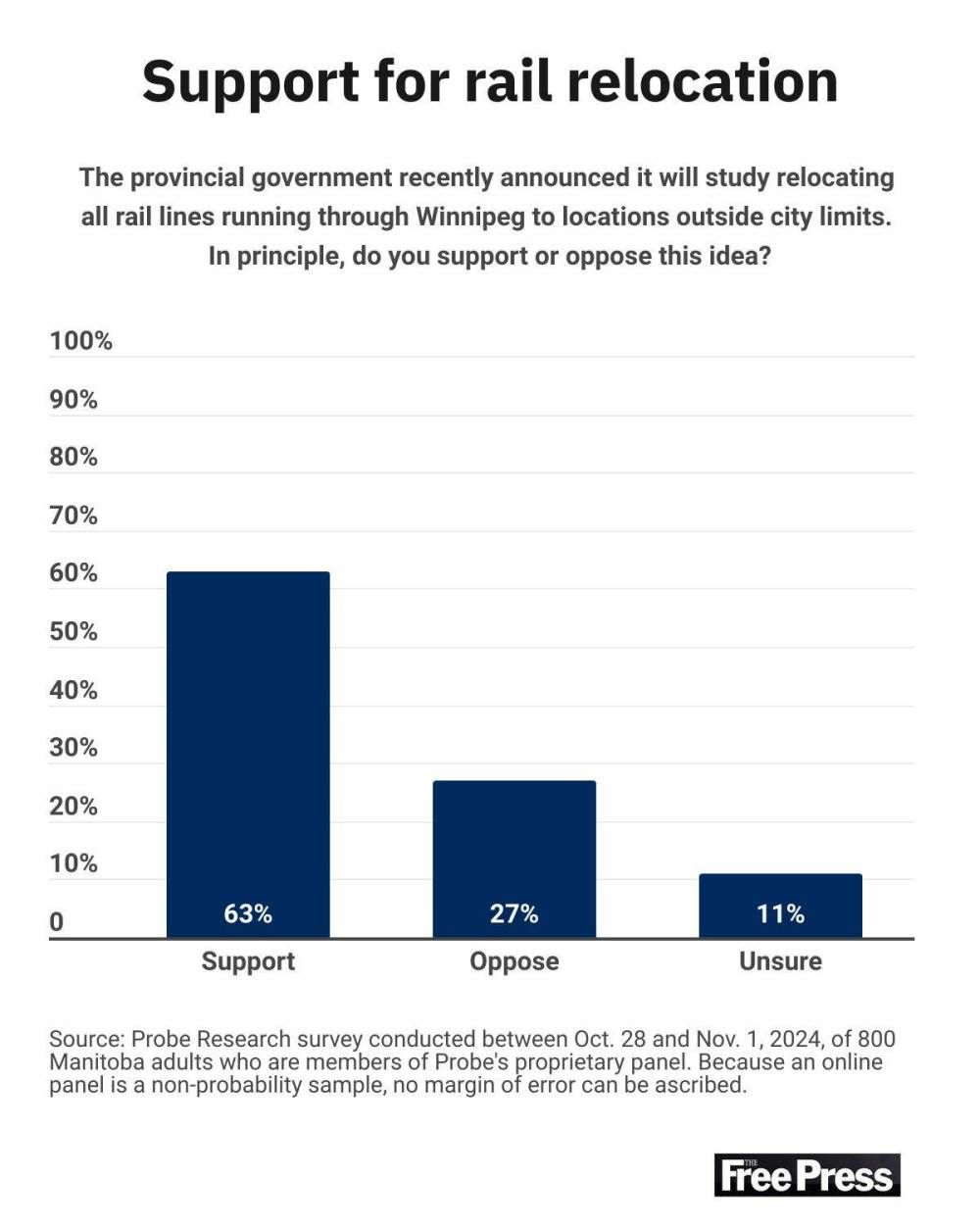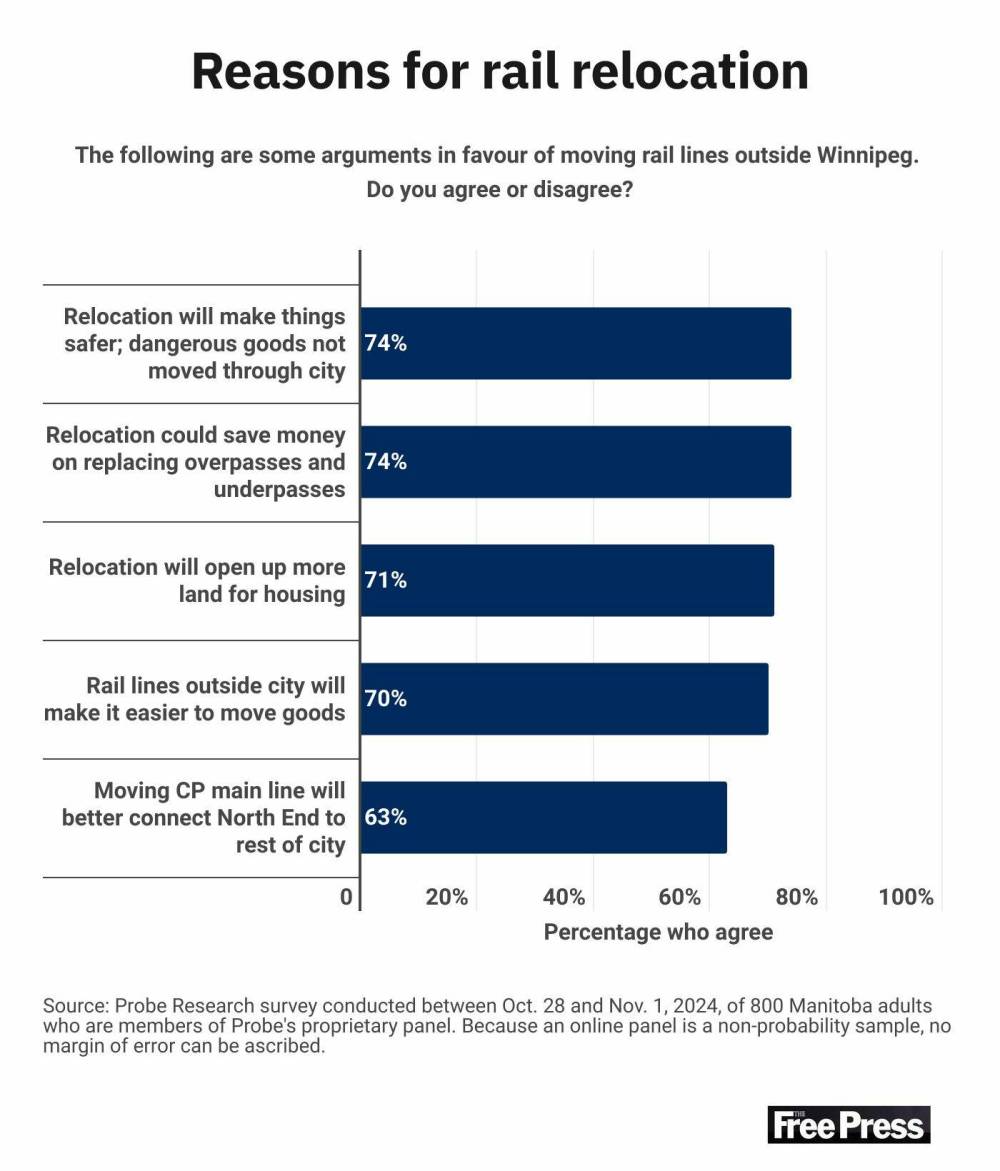A majority of Manitobans favour moving rail lines and yards out of Winnipeg, but have significant concerns about the high cost and seriously doubt it will even happen, a new poll suggests.
Probe Research said 63 per cent of respondents strongly or somewhat support proposed rail relocation, while 27 per cent are opposed and 11 per cent are unsure. Support in Winnipeg peaked at 68 per cent.
Skepticism runs deep, with 73 per cent of respondents saying relocation is very or somewhat unlikely to happen.

Former federal Liberal cabinet minister Lloyd Axworthy, encouraged by the level of support, said a feasibility study he is leading will, once published, allow Manitobans to make fairer and better-informed decisions on relocation.
“They may be skeptical about whether it could happen or what it could cost, but that’s the reason for the study — to answer those questions,” he told the Free Press. “There hasn’t been a serious presentation of what the pluses and minuses or the pros and cons are.”
Support and doubts have grown since a Probe survey in 2015, in which 59 per cent of respondents were in favour of relocation, and 54 per cent thought it was very or somewhat unlikely to happen.
“I think a lot of people, like I, want to see what is possible,” said Mayor Scott Gillingham.
He said in the past, the proposed redevelopment of a former railyard that is now The Forks was met with skepticism, but people came around when they saw the possibilities.
Probe Research partner Curtis Brown said people could be of the “I’ll believe it when I see it” mindset.
“It’s potentially transformative, but a huge undertaking,” he said.
Probe’s latest survey involved 800 Manitoba adults from Oct. 28 to Nov. 1, after the NDP government launched the two-year, $200,000 feasibility study, in which Axworthy is scheduled to meet with railway companies.
“Evaluating the feasibility of relocating railway infrastructure — and executing such a project — is an enormously complex matter, and the magnitude of the challenges should never be underestimated,” a spokesperson for Canadian Pacific Kansas City Railway Ltd. wrote in an email. “It appears that the public is aware of the significant cost and complexity of those challenges.”

A plan that demonstrates a “good, clear path forward” will help make the case that relocation is worth it and better for the city in the long term, said Kate Kehler, executive director of the Social Planning Council of Winnipeg.
“Sadly, the skepticism is well-earned. This has been a conversation for (decades) and nothing has moved forward,” she said.
Axworthy said relocation, where feasible, would be incremental, with short- and long-term options to be identified. He said he has already identified some small, underused lines that run through neighbourhoods.
By subgroup, support was higher in Winnipeg’s inner neighbourhoods (73 per cent), compared with the outer suburbs (63 per cent) and rural and northern Manitoba (53 per cent).
“We’ve been struggling and yelling about (relocation) for years in Point Douglas. Since Lac-Mégantic, it really does worry us,” said resident Katherine Bitney, referring to a deadly 2013 rail disaster in Quebec.
The survey suggested men, people over 35 and provincial NDP supporters were more likely to back relocation.
Probe’s poll presented five arguments for moving rail lines. About three-quarters of respondents agreed the city would be safer if dangerous goods are no longer moved through neighbourhoods by rail.
The same proportion (74 per cent) agreed relocation could save money in the long run if it means existing overpasses and underpasses do not need to be replaced.
The city is exploring its options to replace the decaying and shuttered Arlington Bridge, which crosses a CPKC yard.

Of the other “for” arguments, 71 per cent agreed moving rail lines will open up land for homes, and 70 per cent think it will be easier to move goods if rail lines were outside city limits.
Probe said 63 per cent believe the North End and rest of the city would be better connected if CPKC’s yard was relocated.
Respondents also had their say on three arguments against relocation.
Probe said 84 per cent agreed Winnipeg has bigger priorities to focus on, and 80 per cent agreed relocation will be too expensive. About half (54 per cent) said companies need easy access to rail shipping in the city.
Potential relocation sites outside the city have not yet been identified. Winnipeg will continue to grow, so officials must carefully determine how far out of the city relocated lines or yards should be situated, if at all, said Prof. Barry Prentice, director of the University of Manitoba’s Transport Institute.
Relocation is feasible, but other options should be considered, he added.
“It really comes down to a question of is there the political will and the money to make that happen,” said Prentice.
Axworthy said relocation is not just about cost, but what it could save in terms of future infrastructure spending, and what it could generate in terms of economic development and growth.
It would bring opportunities for rail transportation in the region to become safer and more effective, he said from Montreal, where he was set to meet with former Quebec premier Jean Charest.

The former NDP government hired Charest in 2016 to lead a relocation task force that was scrapped after the Progressive Conservatives won that year’s election.
The issue was revived by Premier Wab Kinew, following the NDP’s election victory a year ago.
“As we study what’s possible, we’re going to take a balanced, responsible approach that considers all the factors and opportunities for change, no matter how big or how small,” a provincial spokesperson said in response to the poll.
Probe said no margin of error can be ascribed in an online panel survey. It said a probabilistic sample of 800 Manitoba adults would have a margin of error of plus or minus 3.5 percentage points, 19 times out of 20.
The margin of error would be higher in population sub-groups.
chris.kitching@freepress.mb.ca

Chris Kitching
Reporter
Chris Kitching is a general assignment reporter at the Free Press. He began his newspaper career in 2001, with stops in Winnipeg, Toronto and London, England, along the way. After returning to Winnipeg, he joined the Free Press in 2021, and now covers a little bit of everything for the newspaper. Read more about Chris.
Every piece of reporting Chris produces is reviewed by an editing team before it is posted online or published in print — part of the Free Press‘s tradition, since 1872, of producing reliable independent journalism. Read more about Free Press’s history and mandate, and learn how our newsroom operates.
Our newsroom depends on a growing audience of readers to power our journalism. If you are not a paid reader, please consider becoming a subscriber.
Our newsroom depends on its audience of readers to power our journalism. Thank you for your support.